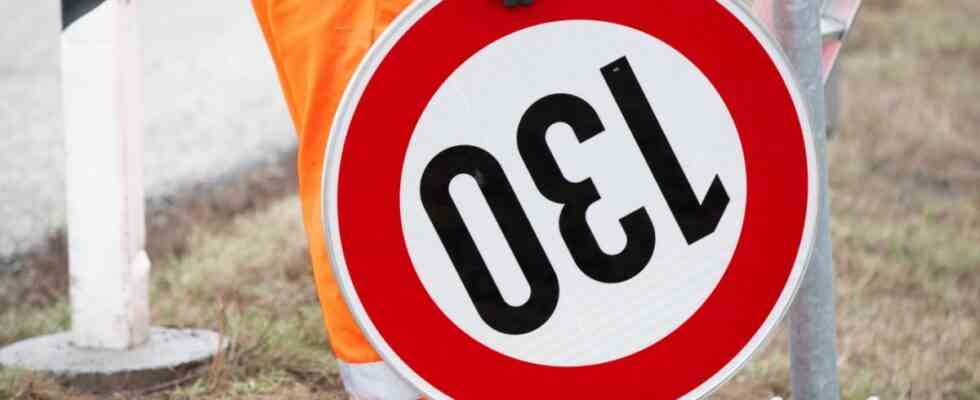On Wednesday they are on the move, but not too fast. Driving fast costs a lot of expensive fuel, and that’s exactly why they set out: truck convoys that drive slowly to Berlin in protest. “Stop the tank rip-off” is written on sheets stretched across the radiator grille. The only question is: Who is ripping off here? Do petroleum companies in particular earn money from expensive fuel?
Federal Economics Minister Robert Habeck (Greens) also raised this question on Wednesday. “It must not be the case that companies make unreasonable profits from the current situation,” he warns. “If there are indications of this, for example when comparing price movements in other EU countries, we will prepare legislative measures.” Because the prices at the gas stations have risen a lot more than the development on the oil markets suggests. The price of the North Sea variety Brent, for example, has almost reached the pre-crisis level again after a high of almost 130 dollars last week. However, fuel prices are falling only slightly – and diesel is still more expensive than petrol.
The Federal Cartel Office, which reports to Habeck, is also alarmed. “If crude oil prices are now falling again and gas station prices don’t follow suit or even continue to rise, you have to take a close look at that,” says Andreas Mundt, President of the Cartel Office. This includes several stages, from the crude oil market to the refineries to the wholesale market and gas stations.
Russian oil comes through the Druzhba pipeline
What exactly is behind it is difficult to determine. Russian oil continues to flow through the Druzhba pipeline. The oil supply to the two East German refineries, Schwedt and Leuna, is “normal”, according to the industry association En2x – which also refers to the high fuel prices across Europe. The high diesel price, in turn, can be explained by the lack of deliveries from Russia: about a tenth of German diesel comes from there. At the same time, diesel demand from Eastern Europe has risen sharply. Diesel is therefore scarcer than petrol.
“The mineral oil companies are currently avoiding Russia when making their purchases,” agrees Thomas Puls, a transport expert at the Cologne Institute for German Economic Research. Replacements are currently relatively difficult to obtain on the world market. The tighter supply could therefore be a reason why the diesel price is falling more slowly than crude oil prices.
However, the Cartel Office does not know exactly how much is refueled and at what price. Although the market transparency office for fuel collects all price data from the mineral oil companies, it does not collect data on the quantities supplied. “A legal obligation for market participants to also provide volume data to the market transparency office would significantly improve the informative value of our data,” says the head of the authority, Mundt.
In contrast, millions of consumers in the country have clear data. Angular numbers on the pumps show them the load. Filling up the tank every week now costs 130 euros instead of the previous 80 euros. That quickly puts a hole of 200 euros or more in the household budget every month. That is why the Federal Consumer Association (vzbv) is demanding a “family bonus” from the federal government of a one-off amount of 1,000 euros, instead of a general reduction in fuel prices through a tank discount, as Finance Minister Christian Lindner (FDP) had brought into play.
There are many proposals for relieving consumers
“It is now a matter of quickly and unbureaucratically relieving those who depend on the car and have little income,” says Marion Jungbluth, mobility expert at the consumer center. Jungbluth says this would also benefit high-earning families with double income, but it would be too bureaucratic to differentiate all taxpayers according to their commute, income and access to alternative means of transport.
The environmental foundation WWF also advocates in a proposal for an “immediate program” for “climate and mobility funds” to relieve households. But it also demands a speed limit on motorways and car-free Sundays. The ADAC, on the other hand, is calling for a temporary reduction in VAT and an increase in the commuter allowance. “It doesn’t work now,” says a spokeswoman for the automobile club, but it would help those “who really depend on the car and are now heavily burdened by it”.
The automobile club and the consumer advice center agree on one thing: Drivers have a number of options for reducing their own fuel consumption. Driving at low speed, braking with foresight – this can also save fuel. And if you don’t fill up at 7 a.m. when prices are highest, but head for the gas station between 6 p.m. and 8 p.m., you can save at least a few cents per liter. The fuel price debacle is a good opportunity for self-restraint, i.e. a kind of speed fasting before Easter. “At 130 you notice that clearly in your wallet,” says the consumer advocate.

